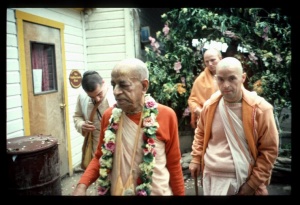SB 3.12.23: Difference between revisions
m (1 revision(s)) |
No edit summary |
||
| Line 1: | Line 1: | ||
{{info | {{info | ||
|speaker=Maitreya | |speaker=Maitreya Ṛṣi | ||
|listener=Vidura | |listener=Vidura | ||
}} | }} | ||
[[Category:Srimad-Bhagavatam - Canto 03 Chapter 12]] | |||
[[Category:Bhagavatam Verses Spoken by Maitreya Rsi - Vanisource|031223]] | |||
<div style="float:left">'''[[Srimad-Bhagavatam]] - [[SB 3|Third Canto]] - [[SB 3.12: Creation of the Kumaras and Others|Chapter 12: Creation of the Kumāras and Others]]'''</div> | |||
<div style="float:right">[[File:Go-previous.png|link=SB 3.12.22]] '''[[SB 3.12.22]] - [[SB 3.12.24]]''' [[File:Go-next.png|link=SB 3.12.24]]</div> | |||
{{RandomImage}} | |||
==== TEXT 23 ==== | ==== TEXT 23 ==== | ||
<div | <div class="verse"> | ||
utsaṅgān nārado jajñe | :utsaṅgān nārado jajñe | ||
dakṣo 'ṅguṣṭhāt svayambhuvaḥ | :dakṣo 'ṅguṣṭhāt svayambhuvaḥ | ||
prāṇād vasiṣṭhaḥ sañjāto | :prāṇād vasiṣṭhaḥ sañjāto | ||
bhṛgus tvaci karāt kratuḥ | :bhṛgus tvaci karāt kratuḥ | ||
</div> | </div> | ||
| Line 16: | Line 22: | ||
==== SYNONYMS ==== | ==== SYNONYMS ==== | ||
<div | <div class="synonyms"> | ||
''utsaṅgāt''—by transcendental deliberation; ''nāradaḥ''—Mahāmuni Nārada; ''jajñe''—was generated; ''dakṣaḥ''—Dakṣa; ''aṅguṣṭhāt''—from the thumb; ''svayambhuvaḥ''—of Brahmā; ''prāṇāt''—from the life air, or breathing; ''vasiṣṭhaḥ''—Vasiṣṭha; ''sañjātaḥ''—was born; ''bhṛguḥ''—the sage Bhṛgu; ''tvaci''—from the touch; ''karāt''—from the hand; ''kratuḥ''—the sage Kratu. | |||
</div> | </div> | ||
| Line 23: | Line 29: | ||
==== TRANSLATION ==== | ==== TRANSLATION ==== | ||
<div | <div class="translation"> | ||
Nārada was born from the deliberation of Brahmā, which is the best part of the body. Vasiṣṭha was born from his breathing, Dakṣa from a thumb, Bhṛgu from his touch, and Kratu from his hand. | Nārada was born from the deliberation of Brahmā, which is the best part of the body. Vasiṣṭha was born from his breathing, Dakṣa from a thumb, Bhṛgu from his touch, and Kratu from his hand. | ||
</div> | </div> | ||
| Line 30: | Line 36: | ||
==== PURPORT ==== | ==== PURPORT ==== | ||
<div | <div class="purport"> | ||
Nārada was born from the best deliberation of Brahmā because Nārada was able to deliver the Supreme Lord to anyone he liked. The Supreme Personality of Godhead cannot be realized by any amount of Vedic knowledge or by any number of penances. But a pure devotee of the Lord like Nārada can deliver the Supreme Lord by his good will. The very name Nārada suggests that he can deliver the Supreme Lord. Nāra means the "Supreme Lord," and da means "one who can deliver." That he can deliver the Supreme Lord does not mean that the Lord is like a commodity that can be delivered to any person. But Nārada can deliver to anyone the transcendental loving service of the Lord as a servitor, friend, parent or lover, as one may desire out of one's own transcendental love for the Lord. In other words, it is Nārada only who can deliver the path of bhakti-yoga, the highest mystic means for attainment of the Supreme Lord. | Nārada was born from the best deliberation of Brahmā because Nārada was able to deliver the Supreme Lord to anyone he liked. The Supreme Personality of Godhead cannot be realized by any amount of Vedic knowledge or by any number of penances. But a pure devotee of the Lord like Nārada can deliver the Supreme Lord by his good will. The very name Nārada suggests that he can deliver the Supreme Lord. ''Nāra'' means the "Supreme Lord," and ''da'' means "one who can deliver." That he can deliver the Supreme Lord does not mean that the Lord is like a commodity that can be delivered to any person. But Nārada can deliver to anyone the transcendental loving service of the Lord as a servitor, friend, parent or lover, as one may desire out of one's own transcendental love for the Lord. In other words, it is Nārada only who can deliver the path of ''bhakti-yoga'', the highest mystic means for attainment of the Supreme Lord. | ||
</div> | </div> | ||
__NOTOC__ | |||
<div style="float:right; clear:both;">[[File:Go-previous.png|link=SB 3.12.22]] '''[[SB 3.12.22]] - [[SB 3.12.24]]''' [[File:Go-next.png|link=SB 3.12.24]]</div> | |||
__NOTOC__ | |||
__NOEDITSECTION__ | |||
Revision as of 09:53, 5 May 2021

A.C. Bhaktivedanta Swami Prabhupada
TEXT 23
- utsaṅgān nārado jajñe
- dakṣo 'ṅguṣṭhāt svayambhuvaḥ
- prāṇād vasiṣṭhaḥ sañjāto
- bhṛgus tvaci karāt kratuḥ
SYNONYMS
utsaṅgāt—by transcendental deliberation; nāradaḥ—Mahāmuni Nārada; jajñe—was generated; dakṣaḥ—Dakṣa; aṅguṣṭhāt—from the thumb; svayambhuvaḥ—of Brahmā; prāṇāt—from the life air, or breathing; vasiṣṭhaḥ—Vasiṣṭha; sañjātaḥ—was born; bhṛguḥ—the sage Bhṛgu; tvaci—from the touch; karāt—from the hand; kratuḥ—the sage Kratu.
TRANSLATION
Nārada was born from the deliberation of Brahmā, which is the best part of the body. Vasiṣṭha was born from his breathing, Dakṣa from a thumb, Bhṛgu from his touch, and Kratu from his hand.
PURPORT
Nārada was born from the best deliberation of Brahmā because Nārada was able to deliver the Supreme Lord to anyone he liked. The Supreme Personality of Godhead cannot be realized by any amount of Vedic knowledge or by any number of penances. But a pure devotee of the Lord like Nārada can deliver the Supreme Lord by his good will. The very name Nārada suggests that he can deliver the Supreme Lord. Nāra means the "Supreme Lord," and da means "one who can deliver." That he can deliver the Supreme Lord does not mean that the Lord is like a commodity that can be delivered to any person. But Nārada can deliver to anyone the transcendental loving service of the Lord as a servitor, friend, parent or lover, as one may desire out of one's own transcendental love for the Lord. In other words, it is Nārada only who can deliver the path of bhakti-yoga, the highest mystic means for attainment of the Supreme Lord.